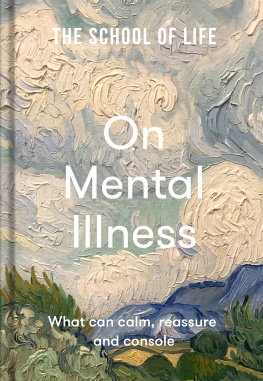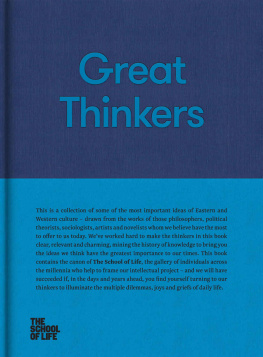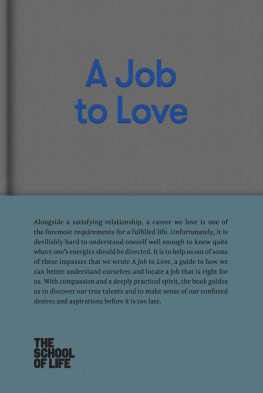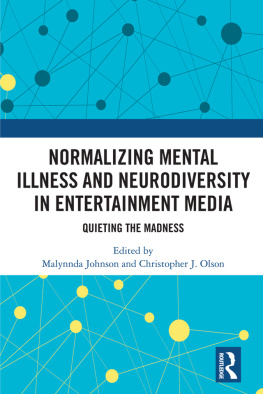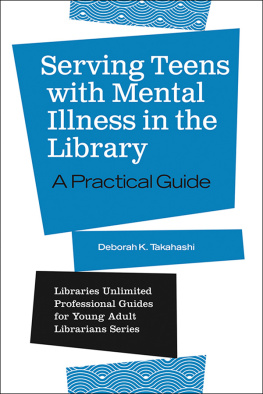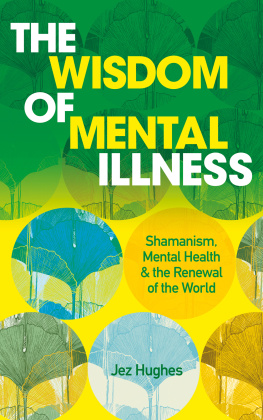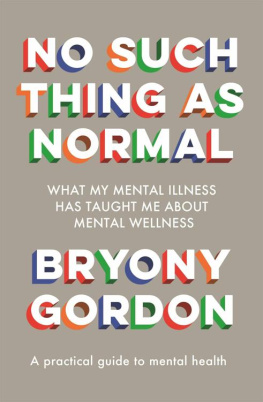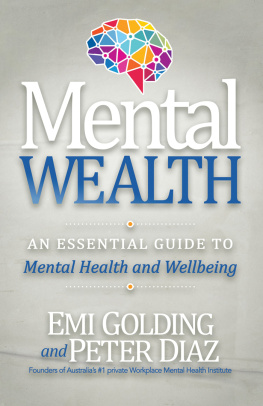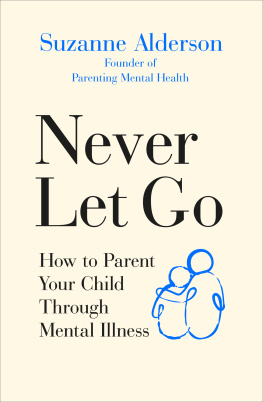Contents
Guide
On Mental
Illness
Contents
Introduction
For a long time, we may cope well enough. We make it to work every morning, we give pleasant summaries of our lives to friends, we smile over dinner. We arent totally balanced, but theres no good way of knowing how difficult things might be for other people, and what we might have a right to expect in terms of contentment and peace of mind. We probably tell ourselves to stop being self-indulgent and redouble our efforts to feel worthy through achievement. We are probably world experts in not feeling sorry for ourselves.
Decades may pass. Its not uncommon for the most serious mental conditions to remain undiagnosed for half a lifetime. We simply dont notice that we are, beneath the surface, chronically anxious, filled with self-loathing and close to overwhelming despair and rage. This too simply ends up feeling normal.
Then, one day, something triggers a collapse. It might be a crisis at work, a reversal in our career plans or a mistake weve made over a task. It might be a romantic failure, someone leaving us or a realisation that we are profoundly unhappy with a partner we had thought might be our long-term future. Alternatively, we feel mysteriously exhausted and sad, to the extent that we cant face anything any more, even a family meal or a conversation with a friend. Or we are struck by unmanageable anxiety around everyday challenges, like addressing our colleagues or going into a shop. Were swamped by a sense of doom and imminent catastrophe. We sob uncontrollably.
We are in a mental crisis. If we are lucky, we will put up the white flag at once. There is nothing shameful or rare in our condition; we have fallen ill, as so many before us have. We need not compound our sickness with a sense of embarrassment. This is what happens when one is a delicate human facing the hurtful, alarming and always uncertain conditions of existence. Recovery can start the moment one admits one no longer has a clue how to cope.
The roots of the crisis almost certainly go a long way back. Things will not have been right in certain areas for an age, possibly forever. There will have been grave inadequacies in the early days, things that were said and done to us that should never have occurred and bits of reassurance and care that were ominously missed out on. On top of this, adult life will have layered on difficulties that we were not well equipped to know how to endure. It will have applied pressure along our most tender, invisible fault lines.
Our illness is trying to draw attention to our problems, but it can only do so inarticulately, by throwing up coarse and vague symptoms. It knows how to signal that we are worried and sad, but it cant tell us what about and why. That will be the work of patient investigation, over months and years, probably in the company of experts. The illness contains the cure, but it has to be teased out and its original inarticulacy interpreted. Something from the past is crying out to be recognised and will not leave us alone until we have given it its due.
At points, it may seem like a death sentence, but beneath the crisis we are being given an opportunity to restart our lives on a more generous, kind and realistic footing. We should dare to listen to what our pain is trying to tell us.
***
Mental health is a miracle we are apt not to notice until it slips from our grasp at which point we may wonder how we ever managed to do anything as complicated and beautiful as order our thoughts sanely and calmly.
A mind in a healthy state is, in the background, continually performing a near-miraculous set of manoeuvres that underpin our moods of clear-sightedness and purpose. To appreciate what mental health involves (and therefore what makes up its opposite), we should take a moment to consider some of what will be happening in the folds of an optimally functioning mind.
First and foremost, a healthy mind is an editing mind, an organ that manages to sieve, from thousands of stray, dramatic, disconcerting or horrifying thoughts, those particular ideas and sensations that actively need to be entertained in order for us to direct our lives effectively.
Partly this means keeping at bay punitive and critical judgements that might want to tell us repeatedly how disgraceful and appalling we are, long after harshness has ceased to serve any useful purpose. When we are interviewing for a new job or taking someone on a date, a healthy mind doesnt force us to listen to inner voices that insist on our unworthiness. It allows us to talk to ourselves as we would to a friend.
At the same time, a healthy mind resists the pull of unfair comparisons. It doesnt constantly allow the achievements and successes of others to throw us off course and reduce us to a state of bitter inadequacy. It doesnt torture us by continually comparing our condition to that of people who have, in reality, had very different upbringings and trajectories through life. A well-functioning mind recognises the futility and cruelty of constantly finding fault with its own nature.
Along the way, a healthy mind keeps a judicious grip on the faucet of fear. It knows that, in theory, there is an endless number of things that we could worry about: a blood vessel might fail, a scandal might erupt, the planes engines could shear from their wings But it has a good sense of the distinction between what could conceivably happen and what is in fact likely to happen. It is able to leave us in peace as regards the wilder eventualities of fate, confident that awful things will either not unfold or could be dealt with ably enough if ever they did so. A healthy mind avoids catastrophic imaginings: it knows that there are broad and stable stone steps, not a steep and slippery incline, between itself and disaster.
A healthy mind has compartments with heavy doors that shut securely. It can compartmentalise where it needs to. Not all thoughts belong at all moments. While talking to a grandmother, the mind prevents the emergence of images of last nights erotic fantasies; while looking after a child, it can repress its more cynical and misanthropic analyses. Aberrant thoughts about jumping on a train line or harming oneself with a sharp knife can remain brief, peculiar flashes rather than repetitive fixations. A healthy mind has mastered the techniques of censorship.
A healthy mind can quieten its own buzzing preoccupations in order, at times, to focus on the world beyond itself. It can be present and engaged with what and who is immediately around. Not everything it could feel has to be felt at every moment.
A healthy mind combines an appropriate suspicion of certain people with a fundamental trust in humanity. It can take an intelligent risk with a stranger. It doesnt extrapolate from lifes worst moments in order to destroy the possibility of connection.
A healthy mind knows how to hope; it identifies and then tenaciously hangs on to a few reasons to keep going. Grounds for despair, anger and sadness are, of course, all around. But the healthy mind knows how to bracket negativity in the name of endurance. It clings to evidence of what is still good and kind. It remembers to appreciate; it can despite everything still look forward to a hot bath, some dried fruit or dark chocolate, a chat with a friend or a satisfying day of work. It refuses to let itself be silenced by all the many sensible arguments in favour of rage and despondency.
Outlining some of the features of a healthy mind helps us to identify what can go awry when we fall ill; at the heart of mental illness is a loss of control over our own better thoughts and feelings. An unwell mind cant apply a filter to the information that reaches our awareness; it can no longer order or sequence its content. From this, any number of painful scenarios ensue.

